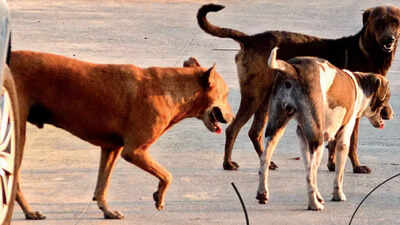Top Searches
- News
- City News
- coimbatore News
- Clear enumeration, skilled vets and more ABC centres key to solving dog-human conflict: Experts
Clear enumeration, skilled vets and more ABC centres key to solving dog-human conflict: Experts

Picture used for representational purpose only
COIMBATORE: In September 2022, the Coimbatore city corporation joined hands with two NGOs - Dogs of Coimbatore and Worldwide Veterinary Service - to enumerate 1,11,074 dogs in the city.
This is the first city in Tamil Nadu to conduct a survey, and experts say this is also the first step towards controlling the street dog population in a city and reducing dog-human conflict. It has become important for the Greater Chennai Corporation (GCC) to also have a clear on-ground assessment, and amp up their ABC programmes accordingly.
In 2018, an RTI filed by a Perungudi resident revealed that there were 1.5 lakh dogs in the city, which was much higher than the GCC figures.
“Figures also show that there is a 20% rise in the stray dog population every year,” says Shruti Vinodhraj, member of Tamil Nadu Animal Welfare Board (TNAWB).
“There are three ABC centres currently operational in Chennai – the Kannammapet, Pulianthope and Llyods Road pounds. Each centre can do about 3,000 surgeries a month and 12,000 a year. This means 1 lakh dogs are left out and multiplying at a 20% rate,” she says.
A new ABC centre has now been opened in Sholinganallur and a new one will open in Meenambakkam next week, said GCC’s veterinary officer Kamal Hussain.
Experts say every municipality in Tamil Nadu needs an average of two to four ABC centres, depending on the size of the district, and for them to do 50,000 surgeries per year in the initial years to control the stray population.
Last year, the AWBI had increased the minimum rates for ABC surgeries to Rs 1,400, excluding Rs 200 reserved for the corporation's dog catchers. However, this revision hasn’t reflected on the ground yet, discoursing NGOs and their veterinarians on the GCC list from coming forward to do surgeries. The rates currently still stand at Rs 445 per dog for the GCC and Rs 700 per dog for municipalities, which includes Rs 200 for the corporation’s dog catchers. “The state government is yet to take a final call on this,” said Hussain.
“No surgeries were done during the pandemic, due to which the previously controlled dog population multiplied greatly,” says an animal welfare activist.
“The only way to overtake the birth cycle (which occurs twice a year), is by sterilising and vaccinating at least 70% of the stray population. It is also important to do it scientifically ward by ward, rather than attending to one-off calls from disgruntled residents, and picking up dogs from that neighbourhood for sterilisation. It is also important not to relocate sterilised dogs, which leads to newer strays coming to that neighbourhood, causing them stress and leading to dog-human conflicts,” he says.
Most residential neighbourhoods with a high number of street dogs have a strong community of feeders and a poorly maintained solid waste management system. Stray dogs survive on scavenging waste, and in addition, when regular feeders don’t take the responsibility of also calling GCC to get those dogs sterilised, they are only adding to the problem, say activists and residents.
Pavithra R, a resident of Madipakkam, says poorly done surgeries at government centres also dissuades feeders from calling government helplines. “We find many of our healthy dogs coming back with open wounds and having caught other fatal infections from government pounds. In addition to anti-rabies, it’s important they also give vaccines for fatal infectious diseases such as canine distemper and parvo,” she says.
This is the first city in Tamil Nadu to conduct a survey, and experts say this is also the first step towards controlling the street dog population in a city and reducing dog-human conflict. It has become important for the Greater Chennai Corporation (GCC) to also have a clear on-ground assessment, and amp up their ABC programmes accordingly.
In 2018, an RTI filed by a Perungudi resident revealed that there were 1.5 lakh dogs in the city, which was much higher than the GCC figures.
“Figures also show that there is a 20% rise in the stray dog population every year,” says Shruti Vinodhraj, member of Tamil Nadu Animal Welfare Board (TNAWB).
“There are three ABC centres currently operational in Chennai – the Kannammapet, Pulianthope and Llyods Road pounds. Each centre can do about 3,000 surgeries a month and 12,000 a year. This means 1 lakh dogs are left out and multiplying at a 20% rate,” she says.
A new ABC centre has now been opened in Sholinganallur and a new one will open in Meenambakkam next week, said GCC’s veterinary officer Kamal Hussain.
Experts say every municipality in Tamil Nadu needs an average of two to four ABC centres, depending on the size of the district, and for them to do 50,000 surgeries per year in the initial years to control the stray population.
Last year, the AWBI had increased the minimum rates for ABC surgeries to Rs 1,400, excluding Rs 200 reserved for the corporation's dog catchers. However, this revision hasn’t reflected on the ground yet, discoursing NGOs and their veterinarians on the GCC list from coming forward to do surgeries. The rates currently still stand at Rs 445 per dog for the GCC and Rs 700 per dog for municipalities, which includes Rs 200 for the corporation’s dog catchers. “The state government is yet to take a final call on this,” said Hussain.
“No surgeries were done during the pandemic, due to which the previously controlled dog population multiplied greatly,” says an animal welfare activist.
“The only way to overtake the birth cycle (which occurs twice a year), is by sterilising and vaccinating at least 70% of the stray population. It is also important to do it scientifically ward by ward, rather than attending to one-off calls from disgruntled residents, and picking up dogs from that neighbourhood for sterilisation. It is also important not to relocate sterilised dogs, which leads to newer strays coming to that neighbourhood, causing them stress and leading to dog-human conflicts,” he says.
Most residential neighbourhoods with a high number of street dogs have a strong community of feeders and a poorly maintained solid waste management system. Stray dogs survive on scavenging waste, and in addition, when regular feeders don’t take the responsibility of also calling GCC to get those dogs sterilised, they are only adding to the problem, say activists and residents.
Pavithra R, a resident of Madipakkam, says poorly done surgeries at government centres also dissuades feeders from calling government helplines. “We find many of our healthy dogs coming back with open wounds and having caught other fatal infections from government pounds. In addition to anti-rabies, it’s important they also give vaccines for fatal infectious diseases such as canine distemper and parvo,” she says.
Start a Conversation
FOLLOW US ON SOCIAL MEDIA
FacebookTwitterInstagramKOO APPYOUTUBE









